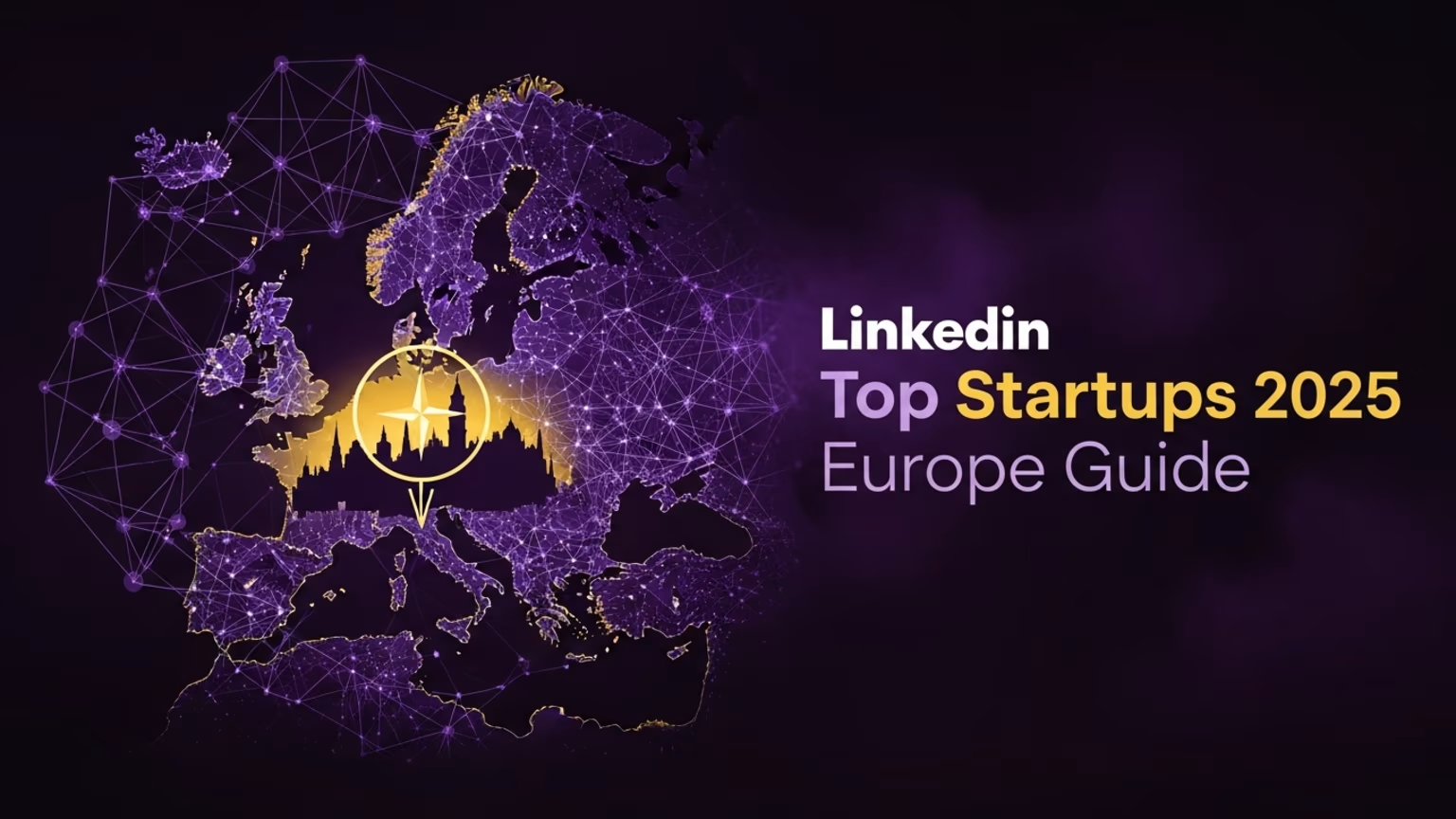
AI & Automation
LinkedIn Top Startups 2025 Europe Guide
Meet the 6 European startups leading 2025. See what makes them top employers.

The quick answer
LinkedIn's 2025 report highlights the number-one ranked startup from six major European countries. Here are the companies leading their respective regions:
- Mistral AI (France): A generative AI company developing advanced language models.
- Helsing (Germany): A software company creating AI algorithms for the defense sector.
- Serenis (Italy): A mental health tech platform for online psychotherapy and support.
- Carbon Equity (Netherlands): An investment platform for climate technology funds.
- Genesy (Spain): A software company that uses AI to automate B2B sales processes.
- Fuse Energy (UK): A renewable energy supplier leveraging technology to serve households.
Meet the 2025 LinkedIn Top Startups in Europe
Every year, LinkedIn data reveals the young companies attracting top talent and significant investment. These are the number-one ranked startups from the 2025 lists for France, Germany, Italy, the Netherlands, Spain, and the UK.
These companies are not just growing quickly. They are shaping the future of their industries, from generative AI to mental wellbeing. Below is a tactical breakdown of each company, the skills they hire for, and what makes them a top workplace.
Mistral AI: France's Generative AI Decacorn
Mistral AI has quickly become a leader in the generative artificial intelligence space. Based in Paris, the company focuses on creating powerful and efficient AI models, positioning itself as a key European player in the global AI race.
Its rapid growth and high valuation highlight the intense demand for advanced AI solutions. Building a strong digital footprint through a professional website is critical for companies like this to attract elite engineering talent.
- What they do: Develop generative AI models for enterprise use.
- Headquarters: Paris, France
- Year founded: 2023
- Full-time headcount: 350
- Most common skills: Data Science, Machine Learning, Programming
- Largest job functions: Engineering, Business Development, Sales
Helsing: Germany's Defense AI Software Leader
Helsing is a technology company that specializes in software and artificial intelligence for the defense and security sector. It builds AI-powered systems that process data from sensors to create real-time situational awareness.
The company operates across Europe from its Munich headquarters, aiming to provide democratic nations with advanced technological capabilities. Its focus is on software architecture and AI algorithms, not hardware manufacturing.
- What they do: Develop software and AI algorithms for defense applications.
- Headquarters: Munich, Germany
- Year founded: 2021
- Full-time headcount: 950
- Most common skills: Aerospace, Machine Learning, MATLAB
- Largest job functions: Engineering, Programme Management, Product Management
Serenis: Italy's Mental Health Tech Innovator
Serenis is a mental health care startup that provides psychotherapy, coaching, and psychological support through video calls. The platform uses data and digital tools to improve the effectiveness of therapy and match patients with the right provider.
By making mental health care more accessible and data-driven, Serenis addresses a critical need in the healthcare market. Their success shows the power of a clear mission communicated through targeted digital channels.
- What they do: Offer online psychotherapy and mental health support.
- Headquarters: Milan, Italy
- Year founded: 2021
- Full-time headcount: 60
- Most common skills: Psychology, Psychotherapy, Mental Health
- Largest job functions: Healthcare, Engineering, Marketing
Carbon Equity: Netherlands' Climate Tech Investment Platform
Based in Amsterdam, Carbon Equity provides a platform for individuals to invest in top-tier climate technology funds. The company’s mission is to direct capital toward startups that are developing solutions to combat climate change.
Carbon Equity's model opens up venture capital-style climate investing to a wider audience, helping to fund the next generation of green technology. Clear, effective SEO content helps them attract both mission-aligned investors and talent.
- What they do: Facilitate investment in climate tech startup funds.
- Headquarters: Amsterdam, Netherlands
- Year founded: 2021
- Full-time headcount: 33
- Most common skills: Entrepreneurship, Marketing Strategy, Python
- Largest job functions: Business Development, Finance, IT
Genesy: Spain's AI Sales Automation Tool
Genesy is a Barcelona-based software startup that uses artificial intelligence to automate B2B sales processes. Their tool helps sales teams identify leads, conduct outreach, and manage conversations more efficiently.
Following a recent funding round, the company plans to expand its operations into other major European markets. This focus on practical, AI-driven automation for a core business function is a key growth trend.
- What they do: Automate B2B sales processes using AI.
- Headquarters: Barcelona, Spain
- Year founded: 2023
- Full-time headcount: 41
- Most common skills: Account Management, Cold Calling, Agile Methodologies
- Largest job functions: Sales, Engineering, Support
Fuse Energy: UK's Renewable Energy Supplier
Founded by former Revolut executives Alan Chang and Charles Orr, Fuse Energy is a renewable energy company supplying households in the UK. The company has raised over $100 million from investors to disrupt the energy market.
Fuse Energy aims to use technology to offer better rates and service in the renewable energy sector. Their ability to attract significant funding and talent demonstrates investor confidence in their tech-first approach to a traditional industry.
- What they do: Supply renewable energy to UK households.
- Headquarters: London, United Kingdom
- Year founded: 2022
- Full-time headcount: 125
- Most common skills: MATLAB, Machine Learning, Python
- Largest job functions: Operations, Engineering, Human Resources
Key Trends from the 2025 Startup List
Looking at these six companies reveals important trends in the European startup ecosystem. These are the patterns that define which companies are attracting talent and investment right now.
The dominance of AI, the focus on solving specific vertical problems, and the high demand for engineering talent are clear themes. Showcasing projects and results in a clean portfolio is essential for service-based companies to compete in this environment.
Trend 1: Artificial Intelligence is the Core Product
For many of these top startups, AI is not just a feature; it is the business. Mistral AI (generative AI), Helsing (defense AI), and Genesy (sales AI) are all fundamentally AI companies solving problems in different industries.
This shows a shift from using AI for internal optimization to building products where AI delivers the core value. The most sought-after skills reflect this, with Machine Learning, Data Science, and Python appearing repeatedly.
Trend 2: Specialized Solutions are Winning
These startups are not trying to be everything to everyone. Each one targets a specific, high-value problem.
- Serenis: Tackles mental health accessibility.
- Carbon Equity: Focuses on funding climate tech.
- Fuse Energy: Aims to fix the renewable energy supply model.
This vertical focus allows them to build deep expertise and create products that truly resonate with a specific customer base, leading to faster growth and market leadership.
How LinkedIn Ranks the Top Startups
LinkedIn's methodology for ranking startups is data-driven and based on actions taken by its members. Understanding the ranking factors gives insight into what makes a company an attractive place to work.
The evaluation is based on four pillars, measured between July 2024 and June 2025.
The Four Pillars of Evaluation
LinkedIn measures startups based on a combination of growth and interest signals:
- Employee Growth: The percentage increase in headcount over the measurement period, requiring a minimum of 10% growth.
- Engagement: Views and follows of the company's LinkedIn page, plus how many non-employees view profiles of people working at the startup.
- Job Interest: The rate at which people view and apply to jobs at the company, including both paid and unpaid postings.
- Attraction of Top Talent: How many employees the startup has recruited from a global LinkedIn Top Company, measured as a percentage of the startup's total workforce.
Eligibility Rules
To be included, companies must meet strict criteria. They must be:
- Fully independent and privately held.
- 5 years old or younger.
- Have 30 or more full-time employees.
- Headquartered in the country on whose list they appear.
Staffing firms, consulting firms, venture capital firms, nonprofits, and government entities are excluded. Startups that have conducted significant layoffs (10% or more) are also ineligible, ensuring the list reflects stable, growing organizations.
read more
Similar articles

Use GPT Image 1.5 for marketing content creation

How to improve brand visibility in AI search
Let’s grow
Start your monthly marketing system today
No guesswork, no back-and-forth. Just one team managing your website, content, and social. Built to bring in traffic and results.




